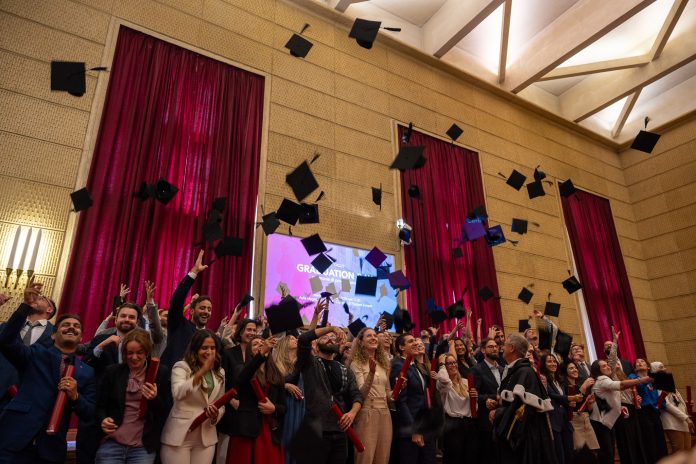by InTrieste
In a ceremony marked by tradition and innovation, the University of Trieste conferred PhDs on 133 new graduates, the highest number in its history. The ceremony, held on Monday in the grand Aula Magna at Piazzale Europa, featured the classic flourish of the “hat toss” — a symbolic moment of celebration for the university’s latest cohort of young researchers.
This year’s PhD graduates reflect a broader trend toward internationalization at the university, with 20 percent of the recipients hailing from outside Italy. The ceremony also underscored the institution’s commitment to gender parity, achieving a near-equal distribution of male and female PhD candidates.
“Graduation Day is not just a celebration of the remarkable achievements of our young researchers,” said Alessandro Baraldi, the university’s Rector’s Advisor for Scientific Research and PhD Programs, “but also a moment of gratitude. These PhD candidates are a cornerstone of our research efforts.”
Baraldi noted that this year’s celebrations will culminate on December 2, when five highly innovative doctoral theses will be awarded the PhD Innovation Awards, a highlight of the university’s centennial celebrations.
A Century of Excellence
The awards, a new initiative by the University of Trieste, will recognize outstanding contributions to research across a range of disciplines, spotlighting innovation in thought, methodology, and technology. The prizes are designed to honor creativity and ingenuity, in keeping with the university’s century-long legacy of academic excellence.
“This is a unique opportunity to celebrate a century of research, creativity, and innovation,” Baraldi added, emphasizing that the awards will position the university as a leader in cutting-edge scientific thinking.
A Visionary Keynote
The ceremony’s keynote address was delivered by Marco Gori, a renowned Professor of Computer Science from the University of Siena, whose lecture, “Intelligent Machines That Do Not Accumulate Data,” offered a fresh perspective on artificial intelligence.
In contrast to the current AI models reliant on vast data sets, Gori proposed an alternative approach inspired by the natural world, where machines develop cognitive abilities through interaction with their environment rather than the massive accumulation of information.
“The future of AI may not lie in centralized data collection,” Gori explained. “Just as living organisms learn through experience, so too could machines, reducing both privacy risks and the concentration of power in a few hands.”
The event, which blended the traditional pomp of academic ceremonies with forward-thinking discourse on the future of technology and innovation, reflected the University of Trieste’s dual focus: honoring the past while looking toward a future driven by scientific discovery and international collaboration.
As the hats flew into the air, it was clear that for these new PhD holders, the future is just beginning.





























